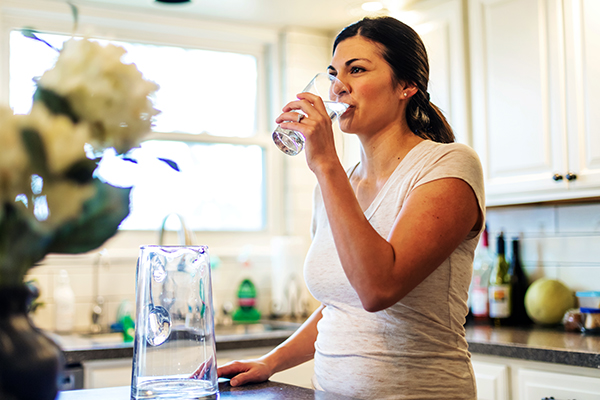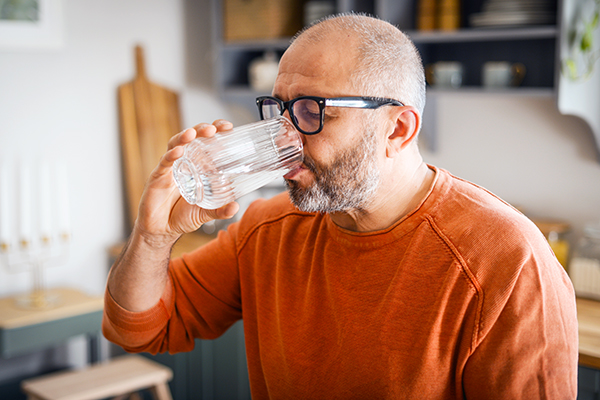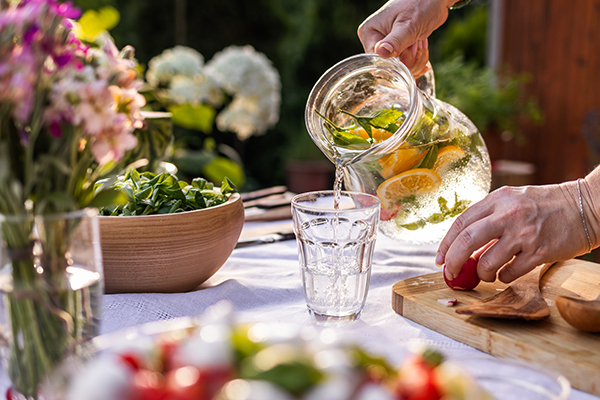It’s hard to overstate the importance of hydration. Water is essential to the function of every cell in the body — it helps to transport oxygen and nutrients, cushion the joints, regulate body temperature, aid in digestion, flush out waste, and more.
And if you’re trying to lose weight, research suggests drinking water can also play a role in helping you reach your weight-loss goals.
So how exactly does water help you lose weight, and how much should you aim to drink each day? Here’s what you need to know.
How Much Water Should I Drink to Lose Weight?

There’s no specific amount of water you need to drink for weight loss, but simply hitting your recommended intake each day can support your weight loss goals in a few ways:
How much water do you need to drink to reap those benefits?
You’ve probably heard the “8×8 rule” — the age-old advice to drink eight 8-ounce glasses of water each day — but there’s no science behind that number.
According to the National Academy of Medicine, the actual recommended total water intake for men ages 19 and older is 3.7 liters per day (around 13 cups). For women in the same age range, the recommended total is 2.7 liters per day (around 11 cups).
But before you start filling up a gallon jug, keep in mind that around 20 percent of fluid intake typically comes from food — especially foods with a high water content like fruits, veggies, soup, or yogurt.
So the amount you actually need to drink is a bit less.
And not every ounce needs to be plain water — coffee and tea can contribute to your hydration goals, along with milk, juice, and other beverages. You can also jazz up a glass of water with a squeeze of lemon or a few slices of cucumber to make it more enticing.
How Drinking Water Affects Metabolism and Appetite

Drinking enough water each day can benefit your metabolism and may help to reduce appetite, both of which may help with weight loss.
One potential benefit comes from thermogenesis — the body’s process of generating heat.
When you drink a glass of water, your body warms that water to your internal temperature of 98.6 degrees.
In a small study, researchers found that drinking 500 milliliters (around 16 ounces) of room-temperature water temporarily increased metabolic rate by up to 30 percent.
For men, most of that increased calorie burn came from fat; for women, carbs were the main energy source.
Some have speculated that ice-cold water may offer a bigger calorie burn since your body has to work even harder to warm it up — but alas, research suggests the added benefit is pretty minimal. So stick with whatever water temperature you enjoy, whether it’s frosty or tepid.
Drinking water before a meal can also help you to feel more satiated. In a 2018 study, participants consumed less food when they drank 500 milliliters of water (16 ounces) before a meal — in addition, they didn’t report feeling less satiated.
Another study of middle-aged to older adults found that consuming 500 ml of water before each meal — combined with a low-calorie diet — led to more weight loss than a low-calorie diet alone.
These studies suggest that drinking water before a meal could help keep your appetite in check — and either way, making pre-meal hydration a habit can help you stay on track to hit your daily intake goals.
Factors that Affect Your Water Needs

When it comes to water intake, the official guidelines are a solid starting point, but your own personal needs may vary from day to day depending on a few factors:
- Age. Infants, children, and teenagers have lower water intake needs than adults.
- Gender. From age 19 onward, men typically have higher water intake needs than women.
- Weight. Your specific needs may vary based on your body weight.
- Activity level. After a workout, you’ll need to replenish the fluids lost through sweat.
- Location. People in hot climates and high altitudes may need more water per day.
- Pregnancy and breastfeeding. The recommended daily intake increases to 10 cups a day during pregnancy and 13 cups per day while breastfeeding.
- Overall health. Certain health conditions such as fever, vomiting, and diarrhea may increase fluid needs.
How to Calculate Hydration for Weight Loss
Want to calculate your specific hydration needs?
Start with a daily goal of drinking half your body weight in ounces of water each day. To find your baseline, simply divide your weight in pounds by two. If you weigh 160 pounds, for example, aim to get at least 80 ounces per day.
Next, figure out how much additional water you may need based on your workout plans.
The American Council On Exercise (ACE) recommends consuming fluids before, during, and after working out:
- 17 to 20 ounces two hours before your workout.
- 7 to 10 ounces every 10 to 20 minutes during exercise.
- 16 to 24 ounces for every pound of body weight lost after a workout.
If you’re not in the mood to do the math, you can also estimate your daily water needs using an online hydration calculator.
But keep in mind these calculators can only provide a rough estimate using a few metrics. Your exact needs may vary day to day based on everything from workout intensity to the weather.
If you want an easy way to gauge whether you’re getting enough water, check the color of your urine. If it’s clear or pale yellow, you’re good to go. If it’s darker yellow or amber, increase your water intake.
Other warning signs of dehydration include dry mouth, bad breath, fatigue, and sugar cravings.
Dropping too much water weight after you exercise may also signal dehydration.
If you lose 2 percent or more of your body weight over the course of a workout can hinder your performance, so you may need to step up your hydration game.
6 Tips for Increasing Water Intake for Weight Loss

These simple steps can help you boost your H2O intake.
- Make hydration part of your daily wellness routine. Start each day by drinking a glass of water before you get out of bed.
- Choose water-packed foods such as melons, berries, apples, grapes, squash, leafy greens, and yogurt.
- Make plain water more appealing with refreshing fruit-infused water recipes.
- Invest in a reusable water bottle or mug that you love — you’ll be more inspired to keep it with you and sip throughout the day.
- Set reminders on your phone to take a water break every hour during your workday.
- Practice “habit stacking” by pairing hydration with another healthy habit — drink a glass of water before you brush your teeth, or sip a cup of tea during your morning meditation.
Drinking water alone isn’t the golden ticket to weight loss. You’ll still have to tighten up your nutrition, be consistent with your workouts, and get enough sleep.
But proper hydration can support a healthy metabolism, help you feel more satiated at mealtime, and prevent dehydration from derailing your workouts — all of which can ultimately help you reach your weight-loss goals.
